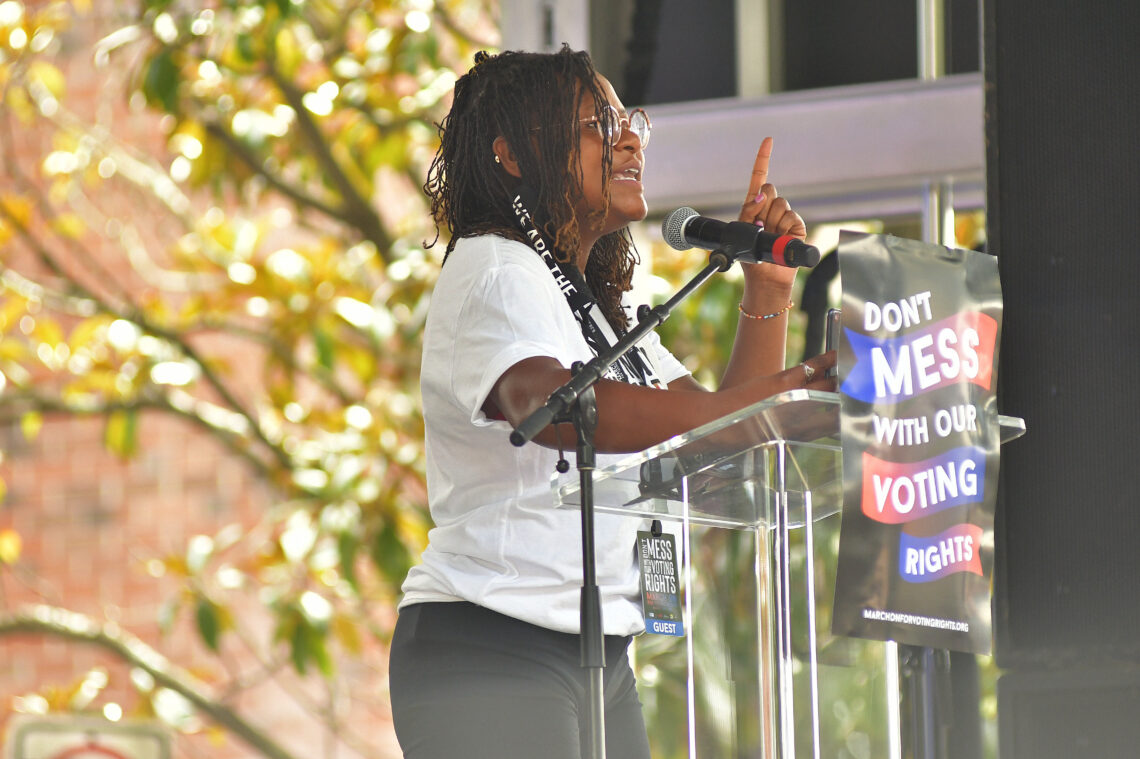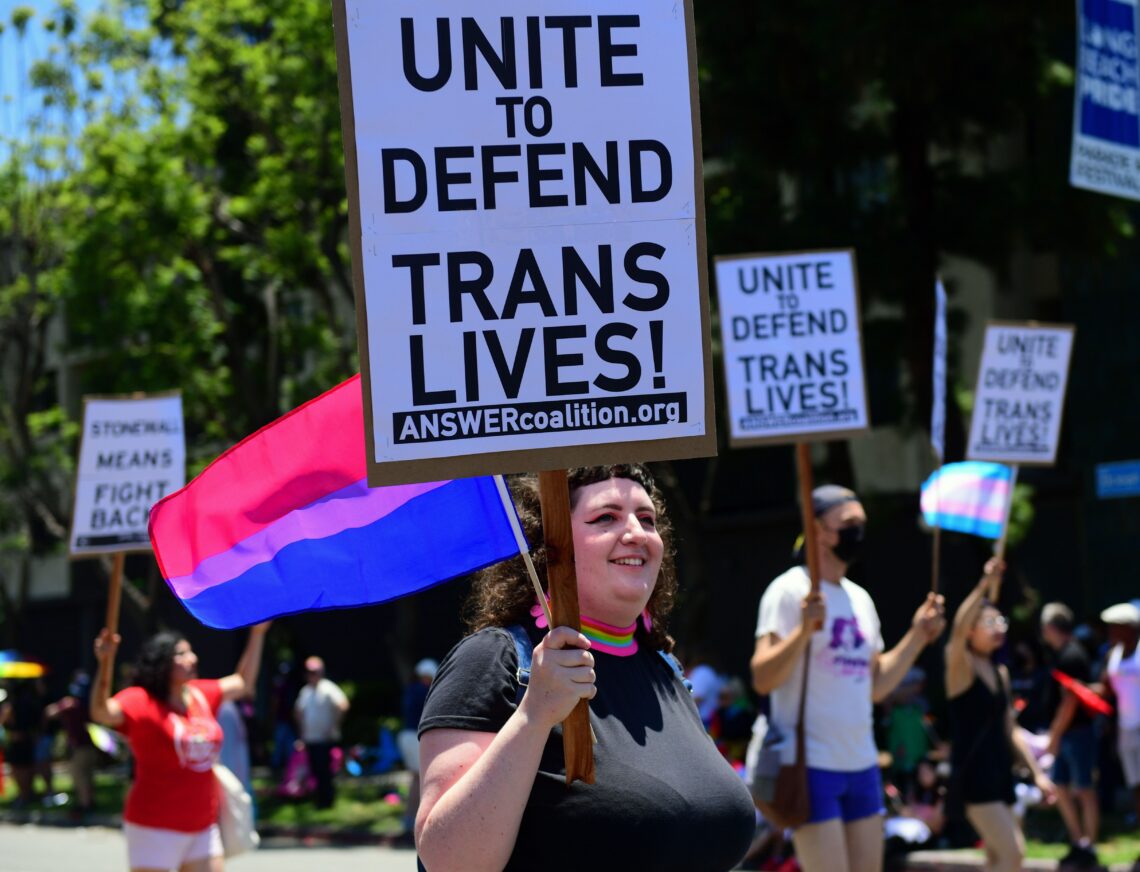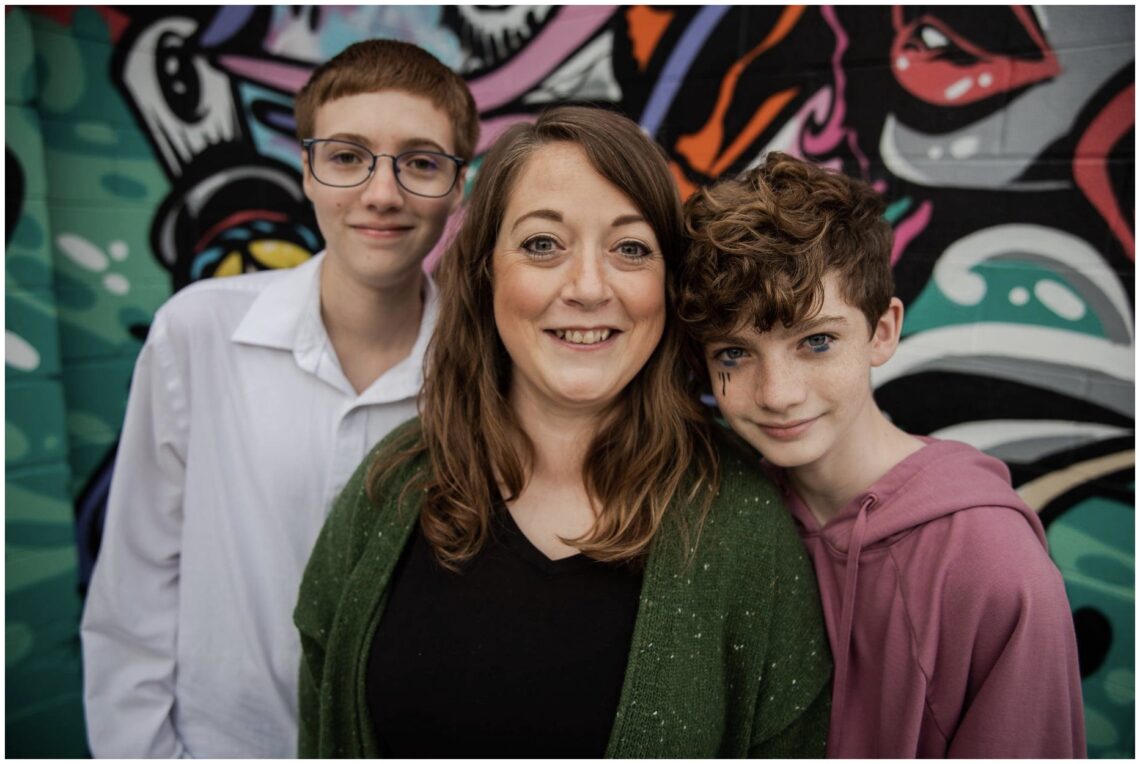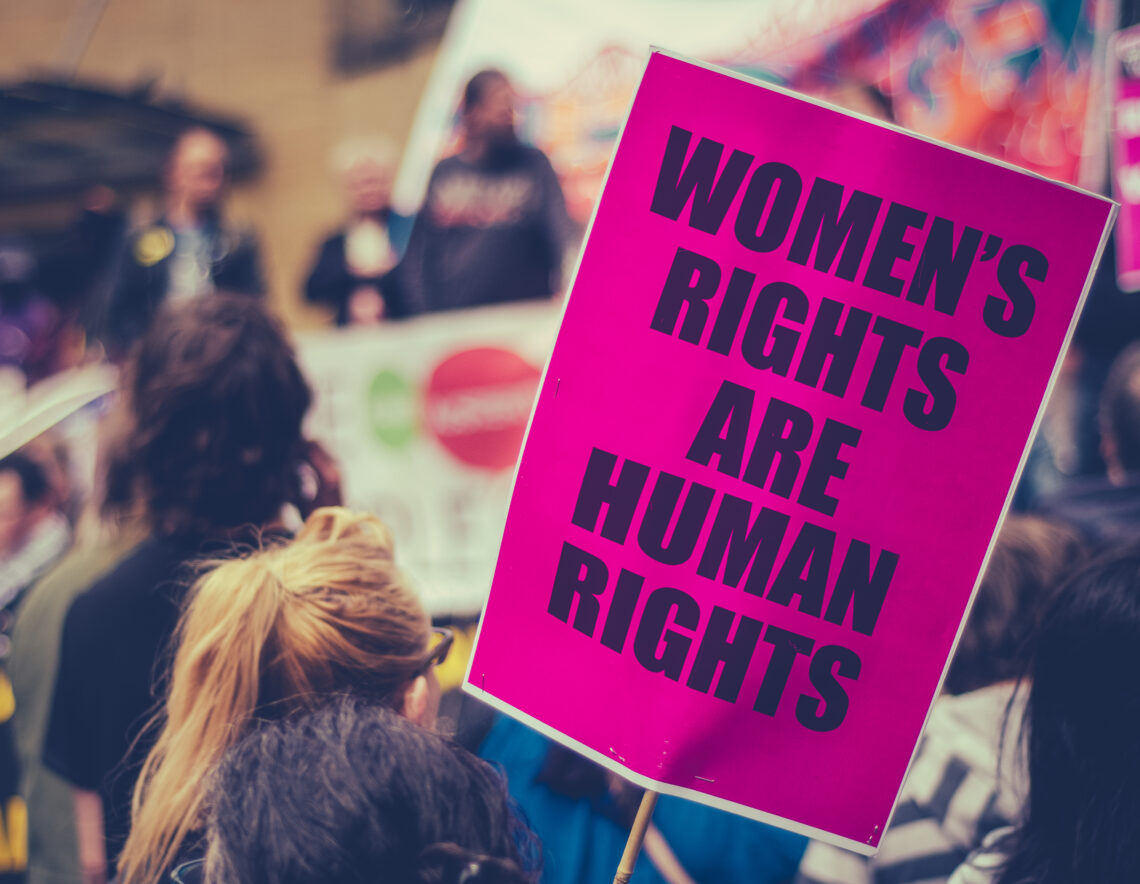
What does an “activist elected official” forsee in the future for queer rights?
The following interview is part of LGBTQ Nation‘s six-part Queer State of the Union, in which we speak with some of the nation’s queer leaders to find out what they see as the challenges — and solutions — for the queer community and our struggle for equal rights.
Park Cannon was first elected as a Georgia lawmaker in 2016 at only 24 years old.
The youngest elected official in the state legislature, she demonstrated early on that she had an insatiable energy for fighting for equity and standing up for marginalized groups.
Now 31, Cannon remains a vehement advocate for reproductive justice, voting rights, and equality.
 Get the Daily Brief The news you care about, reported on by the people who care about you.
Get the Daily Brief The news you care about, reported on by the people who care about you. In a 2020 interview with LGBTQ Nation, Cannon described herself as an “activist elected official” who will settle for nothing less than sweeping change.
AdBridg.cmd.push(function() { AdBridg.display("div-gpt-ad-inarticle2"); });Cannon was instrumental in passing 2019 legislation that created a three-year Georgia pilot program to provide PrEP to those at high risk for HIV. According to Cannon, the program will be expanded this year.
A doula and preschool teacher, Cannon serves on the Board of Directors for the Reproductive Justice organization SisterSong, the lead plaintiff in the 2019 case challenging Georgia’s restrictive law banning abortion after six weeks of pregnancy, although the case ultimately did not stop the law from taking effect.
 State Representative for Georgia House District 58, Park Cannon speaks at the March On For Voting Rights at The King Center on August 28, 2021, in Atlanta, Georgia. Photo by Derek White/Getty Images.
State Representative for Georgia House District 58, Park Cannon speaks at the March On For Voting Rights at The King Center on August 28, 2021, in Atlanta, Georgia. Photo by Derek White/Getty Images. On her own, Cannon has also spoken out repeatedly for reproductive rights. In 2019, she opened up about her own abortion during a powerful speech on the House floor.
“I stand here today confident in my decision to terminate my pregnancy when I was sexually assaulted in 2010,” she said. “As a member of the LGBTQ community, there are many people who believe they can ‘rape us straight.’ I do not deserve to live in a world or a state where people believe that I should be ashamed because of my sexual orientation.”
In 2021, Cannon became a national name after she was arrested for standing up to S.B. 202, a law that significantly rolled back voting rights for Georgians. The bill increased voter ID requirements for absentee ballots, allowed state officials to take over local elections, limited the use of ballot drop boxes, and even made it a crime to give water to people standing in line to vote.
Cannon, who is Black, was arrested by a white state trooper for knocking on Gov. Brian Kemp’s (R) office door as he signed the bill in a closed-door ceremony. Charges against Cannon were ultimately dropped.
“We will not live in fear and we will not be controlled,” she wrote on Twitter after her arrest. “We have a right to our future and right to our freedom. We will come together and continue fighting white supremacy in all its forms.”
AdBridg.cmd.push(function() { AdBridg.display("div-gpt-ad-inarticle3"); });We will not live in fear and we will not be controlled. We have a right to our future and a right to our freedom. We will come together and continue fighting white supremacy in all its forms. https://t.co/kKsiPZBuqV
— Representative Park Cannon (@Cannonfor58) March 26, 2021Cannon spoke with LGBTQ Nation about the state of the queer movement in 2023 and what must be done to advance equality. The conversation occurred on December 13, 2022, mere minutes after President Biden signed the Respect For Marriage Act, which requires the federal government to recognize same-sex marriage.
LGBTQ NATION: Biden signed the Respect for Marriage Act. How are you feeling?
PARK CANNON: This is courage. This is breaking news. The last time I felt this way was when, in the state of Georgia, we passed the anti-hate crime bill [in 2020], and it was decades-long work of queer activists, Black politicos, and faith-based coalitions coming together.
This feels very similar to some of the pro-equality work we’ve done here in Georgia, and it reminds us all that as we head back into the legislative session in January, Georgia will need to add some additional state-based protections.
 US President Joe Biden signs the Respect for Marriage Act on the South Law of the White House in Washington, DC, on December 13, 2022. Photo by Brendan Smialowski/AFP via Getty Images.
US President Joe Biden signs the Respect for Marriage Act on the South Law of the White House in Washington, DC, on December 13, 2022. Photo by Brendan Smialowski/AFP via Getty Images. LGBTQ NATION: As the President prepares to address the nation for the State of the Union address, what do you see as the most vexing problems currently facing the queer equality movement?
PC: It’s difficult to break down into less than a handful, but I’ll go with two categories.
The first category is health — understanding breast cancer in a lesbian relationship, understanding uterine fibroids, or a trans person trying to have a successful pregnancy, and understanding hormones and affirmation surgeries for youth. In Georgia, these are all areas that need more support.
AdBridg.cmd.push(function() { AdBridg.display("div-gpt-ad-inarticle4"); });The other category, of course, is basic protections, equal rights protections. So, the ability to own a home with someone who you love who is of the same gender; the ability to purchase life insurance for someone for whom you’ve cared for multiple years; the ability to not be discriminated against and fired because of your identities, whether those are identities that relate to your sexual orientation or your gender identity or gender presentation.
It’s imperative that the newly elected members around the United States listen to their constituents about amending [policies] that do not support healthy families or healthy lives.
LGBTQ NATION: What is the next big rights issue Congress should focus on? What else can legislators accomplish if they give it the same attention they did the Respect for Marriage Act?
PC: The economy affects everyone, and so we need to [ensure that we] don’t isolate LGBTQ families from the safety net and support systems that are coming.
I know that there has been some … money that came out of the American Rescue Plan for schools. I know Georgia will be having a series of dialogues … and they’re actually granting money to school systems to focus on safety.
I am hopeful that that doesn’t necessarily mean more police and stricter dress codes and intensity around bathrooms. I’m hoping that safety includes mental health professionals at schools.
 Participants march in the 2022 Long Beach Pride Parade on July 10, 2022, in Long Beach, California. Photo by Chelsea Guglielmino/Getty Images.
Participants march in the 2022 Long Beach Pride Parade on July 10, 2022, in Long Beach, California. Photo by Chelsea Guglielmino/Getty Images. LGBTQ NATION: What does it mean to you in 2023 to fight for queer rights? How do we best do that?
AdBridg.cmd.push(function() { AdBridg.display("div-gpt-ad-inarticle5"); });PK: It’s about coalitional understanding.
I remember when the White House reached out to one of the nonprofits that I serve on the board of, SisterSong, to ask, what is reproductive justice? For southern queer activists, who have been on the front lines without financial support and without political titles, that phone call was the door opening towards justice.
So we, as members of the queer community, are looking for more doors to open.
LGBTQ NATION: What do you mean by coalitional understanding? What action items do lawmakers need to take to reach it?
PK: The Georgia House of Representatives has never had an LGBTQ caucus.
Under the previous [Republican] speakership, we were not granted a caucus because we were told it would be divisive. Now there’s a new speaker [Republican Jon Burns], so it’s kind of like a new day.
I have requested a meeting with the speaker to ask if we would be able to create a rainbow caucus. Members of the LGBTQ community who are elected could enlist other allies who are in the house to look at measures that affect the community but are not always LGBTQ-specific.
AdBridg.cmd.push(function() { AdBridg.display("div-gpt-ad-inarticle6"); });“We, as members of the queer community, are looking for more doors to open.”
Park CannonAs much as HIV impacts same-gender loving people, so are Caucasian women, according to our Department of Public Health’s most recent pilot program that it just completed. The pilot program just finished its third year and is now actually going to be expanded. We found out the Department of Public Health is asking for more money.
There are opportunities to work on public health and public safety with an LGBTQ caucus, even if you’re not LGBTQ.
Secondly, there is an understanding that LGBTQ children have been a hot topic, and I really think that there’s misunderstanding and a lack of empathy that needs to be addressed through education committees.
 Phoenix May, left, 15, mother Danielle May, and brother Hunter Ray, 12, in Fayetteville, Arkansas, in 2021. Phoenix identifies as transgender and helped launch the Equality Crew, which provides resources and hosts events for queer kids throughout northwest Arkansas. Photo by Lauren Rae.
Phoenix May, left, 15, mother Danielle May, and brother Hunter Ray, 12, in Fayetteville, Arkansas, in 2021. Phoenix identifies as transgender and helped launch the Equality Crew, which provides resources and hosts events for queer kids throughout northwest Arkansas. Photo by Lauren Rae. I’m hopeful that there will be some leadership from the federal government that helps State Departments of Education to really look at the social-emotional learning outcomes and needs of transgender children and their families so that the policymakers who are making decisions on sports or on bathrooms get a better understanding of the emotional impact of these policies. Because most of them do have a soft spot for children, and it’s just very unfair to trans children and queer children that they’re not afforded those same [considerations].
Lastly, as far as the coalitional building conversations, there are numerous nonprofits that have boards of directors that do not include LGBTQ people, and I really think it would be great if we saw larger corporations, larger nonprofits, have clear our leadership in the forefront as they move into 2023.
LGBTQ NATION: This year’s anti-trans bills focus heavily on medical bans targeting both trans kids and adults. As these bills keep coming, do we need a new strategy to fight them?
PK: It definitely goes back to empathy and understanding that bias around sexual orientation and gender identity is harmful.
AdBridg.cmd.push(function() { AdBridg.display("div-gpt-ad-inarticle7"); });We recently passed an anti-hate crime bill in Georgia, but other states still don’t have one, and federally, LGBTQ families have to become more comfortable reporting these instances as issues of bias and hate. Not everyone is economically ready or emotionally ready to file a lawsuit about a traumatizing medical experience that they’ve had, but I do think that the legal routes that we need to take are going to increase and they should talk more about these as issues of bias and hate.
LGBTQ NATION: Across the country, the 2022 midterms were accompanied by an extreme rise in anti-LGBTQ+ rhetoric, yet at the same time, we saw a record number of queer candidates win their elections. What do you make of these two things happening at the same time?
PK: There’s a powerful synergy in being rejected, and I believe that there were so many constituents in Georgia who, due to what they felt were antiquated voting laws, oppressive reproductive health sanctions, and a lack of economic opportunity really became self-mobilized in a way that I’ve not seen before.
When we were calling voters to remind them about election day and texting them to give them their precinct information, overwhelmingly, we received responses that people were on it. Interestingly, I believe that some of the GOP’s reliance on personal responsibility actually benefited marginalized people to meet that expectation of personal responsibility with twofold action.
[Personal responsibility is the idea that we are all responsible for our actions and was a core GOP message for decades, though many say today’s GOP has completely lost sight of it.]
These are the most diverse staff, team members, volunteers I’ve ever seen on elections in Georgia. These were the most bubbly types of events that I’ve ever seen.
“It’s not just about representation; it’s about the legislation that can come from an intergenerational and intersectional perspective.”
Park CannonLGBTQ NATION: You’ve been a tireless advocate for reproductive justice. What will the next few years look like in a post-Roe world?
AdBridg.cmd.push(function() { AdBridg.display("div-gpt-ad-inarticle8"); });PK: I am really proud that last year, I got over 49 legislators to sign a resolution expressing their support for Roe v. Wade on the 49th anniversary, and it was written in a somber tone because we were concerned that it would be the last time being able to celebrate that as people in the South who support people who have had abortions or who need to access abortion.
But at the end of the day, it’s about employment, as well. Many people have built their careers around being abortion doulas, being nurse practitioners who are non-judgmental, by studying the science of the latest techniques and opportunities for reproductive technology. So I care deeply about ensuring that the workforce of reproductive justice advocates can find places of employment that are gainful, dignified, and respectful.
 Cannon says that she cares “deeply about ensuring that the workforce of reproductive justice advocates can find places of employment that are gainful, dignified, and respectful.”
Cannon says that she cares “deeply about ensuring that the workforce of reproductive justice advocates can find places of employment that are gainful, dignified, and respectful.” LGBTQ NATION: Since you were first elected in 2016, do you feel like the conversations you’re having about rights have changed?
PK: I remember when I ran in 2016 and made it clear that I would run openly queer, specifically. I was met with disbelief. I was met with concern, people saying, “Why can’t you just say you’re a lesbian? How are you going to express that in the Bible Belt?”
I had to remind people that authenticity on the election trail can secure trust, confidence and votes. So to now see that the Georgia House of Representatives has a queer representative, has a lesbian, has a gay man – the first gay Asian man we’ve ever had, and now we have two – to see that the Georgia Senate has an openly queer female pastor, that we recently elected another lesbian, a Black lesbian to the house, it’s magical.
It feels like the rainbow wave that I’ve wished for and that I’m also a part of. And I’m really proud that organizations who otherwise could have been edged out over the years for their stances and their supporters are now at the White House in positions of leadership and bringing the issues that matter to us along. It’s not just about representation; it’s about the legislation that can come from an intergenerational and intersectional perspective.
LGBTQ NATION: How do we deal with the relentless right-wing rhetoric leading to book bans, attacks on drag shows, and attacks on trans youth?
AdBridg.cmd.push(function() { AdBridg.display("div-gpt-ad-inarticle9"); });PK: The truth is that growing into a positive self-identity can be complicated, but it can also be really fun. I know the feeling of coming out in the South and expecting that there would be hate. And there was, but there was also a lot of fun and exploration and resistance that teaches people more than they could ever imagine.
So I’m hopeful that we’ll continue to look at LGBTQ culture as groundbreaking and inclusive and not look at it as anything but that.
This interview has been edited for length and clarity.
Featured image: Photos by Derek White/Getty Images, Paras Griffin/Getty Images. Illustration by Kyle Neal for LGBTQ Nation.
PropertySea is the ultimate platform for all your real estate needs. Whether you're searching for your dream home, looking to sell or rent your property, or seeking investment opportunities, PropertySea is your one-stop destination.
Whether you're a homebuyer, seller, renter, or investor, PropertySea is your trusted partner in the real estate market. Discover a world of possibilities, connect with expert agents, and make your property dreams a reality. Start your real estate journey with PropertySea today and experience the convenience, efficiency, and reliability of our comprehensive platform.
Originally posted on: https://www.lgbtqnation.com/2023/02/what-does-an-activist-elected-official-forsee-in-the-future-for-queer-rights/